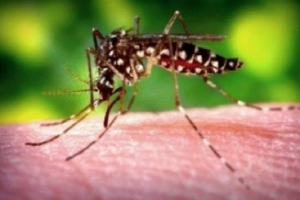Dengue Case Count Continues to Show No Movement

An Aedes aegypti mosquito is pictured here. The mosquito is one of two in Hawai’i known to spread the dengue virus. Hawai’i Department of Health photo.
Another work week begins with no cases new cases of dengue fever confirmed. The count has remained at 260 confirmed since Feb. 24.
The Hawai’i Department of Health has also listed the number of dengue cases “potentially infectious” to mosquitoes at zero since Feb. 24.
Last week, a highlight from DOH was the downgrade of the Kailua-Kona area from being a “high risk” area to a “moderate risk” on the weekly map released on Wednesday’s.
Along with no new cases being confirmed for the past 12 days, 103 cases have been excluded from the overall case count during that time period, including 25 since Friday.
Potential cases excluded from the count include those who have undergone laboratory testing and come back negative, as well as those that have not met case criteria.
DOH, Hawai’i County Civil Defense, Community Response Teams, and community partners began door-to-door dengue education outreach in Kailua-Kona on Feb. 17. The outreach efforts have continued.
Symptoms of dengue fever include fever, joint or muscle pain, headache or pain behind the eyes, and rash.
Those interested in obtaining general information about the current Big Island dengue fever investigation should call 2-1-1 and talk with Aloha United Way.
Anyone who thinks they may have contracted dengue fever on the Big Island should call 933-0912 if they are located in East Hawai‘i or 322-4877 in West Hawai‘i. If an individual is currently ill and concerned that they may have contracted dengue fever, they should contact their primary care physician.
Civil Defense suggests the following to aid in reducing potential mosquito breeding areas around homes and businesses:
- Remove or eliminate standing water that provides sources for mosquito breeding such as buckets or puddles.
- Fix leaky faucets and outdoor hoses that are dripping water.
- Treat bromeliads and other plants that hold water with a larvacide or chlorine bleach solution.
- Clean gutters to allow water to drain freely.
- Repair screens and windows to help keep mosquitoes out.
- Dispose of old tires at no charge at county transfer stations islandwide.
Mosquito concerns should be reported to 974-6010 in East Hawai‘i or 322-1513 in West Hawai‘i.
Sponsored Content
Comments








